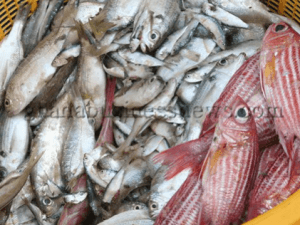Ghana’s fisheries sector said to generate more than GH¢1b annually
 The Minister of Fisheries and Aquaculture Development, Ms Sherry Ayittey, says the sector generates more than GH¢1 billion in revenue annually, and accounted for at least 4.5 per cent of Ghana’s Gross Domestic Product (GDP), while 210,000 people worked directly in the sector, according to a report by the GNA.
The Minister of Fisheries and Aquaculture Development, Ms Sherry Ayittey, says the sector generates more than GH¢1 billion in revenue annually, and accounted for at least 4.5 per cent of Ghana’s Gross Domestic Product (GDP), while 210,000 people worked directly in the sector, according to a report by the GNA.
The Minister pointed out that in spite of the contribution of the fisheries sector to Ghana’s socio –economic development, the sector had not been able to achieve its full potential, with poverty still high in many fishing communities.
She noted that the country was faced with growing challenges in managing its coastal and marine resources, particularly, with the continuous decline in fish stock and production in the last few decades, as well as the degradation of the coastal environment.
Within ten years, Ghana’s peak catch of fish had dwindled from 120,000 metric tonnes to 30,000 tonnes, according to the USAID.
However, in 2011, Ghana’s foreign exchange earnings from the fisheries sector increased significantly by 53 per cent, though the sector recorded a negative growth rate of negative 8.7 per cent over the same period.
Foreign exchange earnings rose from $165.7 million in 2010 to $254.4 million in 2011, with a corresponding increase in the overall fish production by a volume of 6.9 per cent from 2010 to 2011, with inland fisheries and aquaculture contributing significantly to the boost, according to the Agriculture Ministry.
The challenges of the fisheries sector however, are global. It is estimated that the global loss of fish through unsustainable fishing practices is about 20 million tons and Africa’s loss is put at one million tons every year.
Marine fisheries along Africa’s 30,490 km coastline, for instance supports the livelihoods of millions of citizens, according to NEPAD.
Fish is also a highly traded commodity and it is one of the leading export commodities for Africa, with an annual export value of nearly $3 billion. In addition to its direct food value, fish also contributes indirectly to Africa’s food self-sufficiency through trade and exports to the European Union, Asia and other countries, NEPAD adds.
However two-thirds of the estimated over $3 billion worth of fish is harvested is lost to Illegal Unregulated and Unreported (IUU) fishing.
By Emmanuel K. Dogbevi
